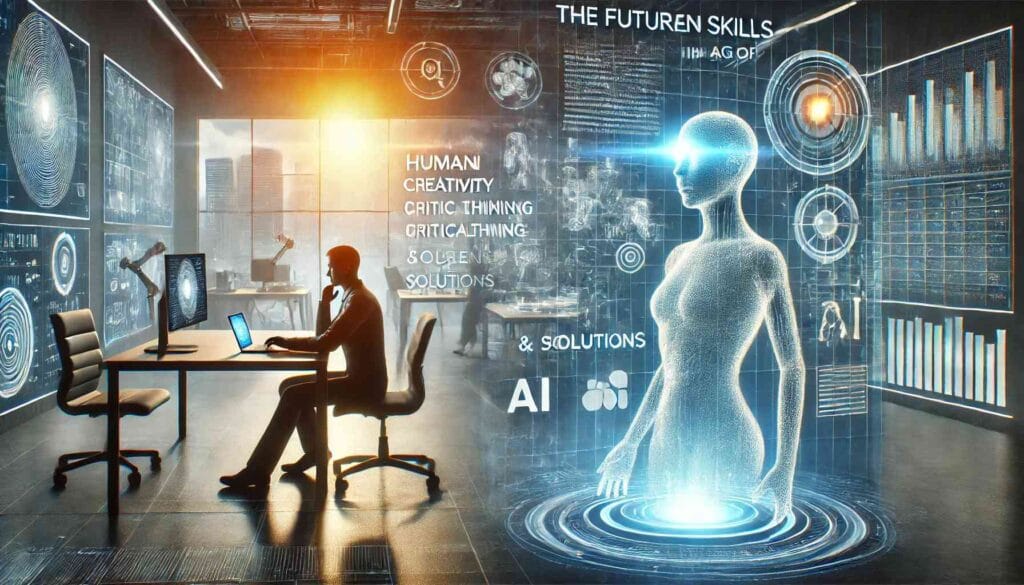The Future of Human Skills in the Age of AI: Which Skills Will Remain Irreplaceable?

As artificial intelligence (AI) continues to advance at an unprecedented pace, it is reshaping industries, automating routine tasks, and even performing complex functions that were once thought to be exclusive to humans. From self-driving cars to AI-generated art, the capabilities of machines are expanding rapidly. However, amidst this technological revolution, one question remains central: What human skills will remain irreplaceable in the age of AI?
While AI excels at processing data, recognizing patterns, and performing repetitive tasks with precision, there are certain uniquely human qualities that machines cannot replicate—at least not in the foreseeable future. These skills are deeply rooted in our emotional intelligence, creativity, and ability to navigate complex social dynamics. Let’s explore the key human skills that will continue to hold immense value in an AI-driven world.
1. Creativity and Innovation
Creativity is the ability to think outside the box, generate original ideas, and solve problems in unconventional ways. While AI can assist in creative processes (e.g., generating music, writing, or designing), it lacks the intrinsic ability to understand context, emotions, and the subtleties of human experience. True innovation often stems from connecting seemingly unrelated concepts, a skill that requires imagination and intuition—qualities that are inherently human.
For example, an AI can compose a song based on existing patterns, but it cannot draw inspiration from personal experiences, cultural nuances, or emotional depth. As such, creativity will remain a uniquely human skill, driving art, literature, and groundbreaking scientific discoveries.
2. Emotional Intelligence (EQ)
Emotional intelligence—the ability to recognize, understand, and manage emotions in oneself and others—is a cornerstone of human interaction. Skills like empathy, active listening, and conflict resolution are critical in fields such as healthcare, education, leadership, and customer service.
AI may simulate empathy through chatbots or virtual assistants, but it cannot genuinely feel or connect with human emotions. For instance, a therapist or a nurse relies on empathy to provide comfort and build trust, something that no machine can authentically replicate. As long as human relationships remain central to society, emotional intelligence will be indispensable.
3. Critical Thinking and Complex Problem-Solving
While AI can analyze vast amounts of data and provide solutions based on existing information, it often struggles with ambiguous or unprecedented scenarios. Humans, on the other hand, excel at critical thinking—evaluating information, questioning assumptions, and making decisions in uncertain environments.
For example, in fields like law, politics, or ethics, where decisions often involve moral dilemmas and subjective judgments, human reasoning is essential. AI can provide data-driven insights, but the final judgment must come from a human who can weigh the broader implications and ethical considerations.
4. Adaptability and Lifelong Learning
The ability to adapt to new situations and continuously learn is a hallmark of human intelligence. While AI systems are designed for specific tasks and require reprogramming to adapt, humans can pivot, acquire new skills, and thrive in dynamic environments.
In a world where technological advancements are constantly reshaping industries, adaptability will be a key differentiator. Humans who embrace lifelong learning and remain open to change will stay ahead of the curve, even as AI automates many traditional roles.
5. Ethical Judgment and Moral Reasoning
AI operates based on algorithms and data, but it lacks a moral compass. Ethical decision-making requires an understanding of cultural, social, and philosophical contexts, as well as the ability to balance competing interests. Humans are uniquely equipped to navigate these complexities.
For instance, in fields like healthcare, journalism, or governance, ethical dilemmas often arise where there is no clear right or wrong answer. Humans must make these decisions, considering the broader impact on society and future generations.
6. Interpersonal Communication and Collaboration
Effective communication and teamwork are essential in virtually every profession. Humans possess the ability to read body language, interpret tone, and build rapport—skills that are crucial for collaboration and leadership.
While AI can facilitate communication through tools like translation apps or virtual meetings, it cannot replace the nuanced interactions that occur in face-to-face conversations. Building trust, inspiring teams, and fostering a sense of community are inherently human endeavors.
7. Cultural and Contextual Understanding
Humans have a deep understanding of cultural nuances, historical contexts, and social dynamics. This knowledge is vital in fields like diplomacy, marketing, and education, where success often depends on tailoring approaches to specific audiences.
AI may analyze cultural trends, but it cannot fully grasp the subtleties of human behavior or the significance of cultural heritage. For example, a human marketer can create campaigns that resonate emotionally with a target audience, leveraging cultural insights that AI might overlook.
Conclusion: The Symbiosis of Humans and AI
The rise of AI does not render human skills obsolete; rather, it highlights the importance of cultivating skills that machines cannot replicate. As AI takes over routine and analytical tasks, humans will have the opportunity to focus on what they do best: creating, empathizing, innovating, and leading.
The future will likely be defined by a symbiotic relationship between humans and AI, where machines handle data-driven tasks, and humans bring creativity, emotional intelligence, and ethical judgment to the table. By embracing this partnership, we can harness the power of AI while preserving the uniquely human qualities that make us irreplaceable.
Final Thought:
In the age of AI, the most valuable asset will not be the ability to compete with machines, but the ability to complement them. By honing our uniquely human skills, we can ensure that we remain indispensable in a world increasingly shaped by technology.
Source : Medium.com




